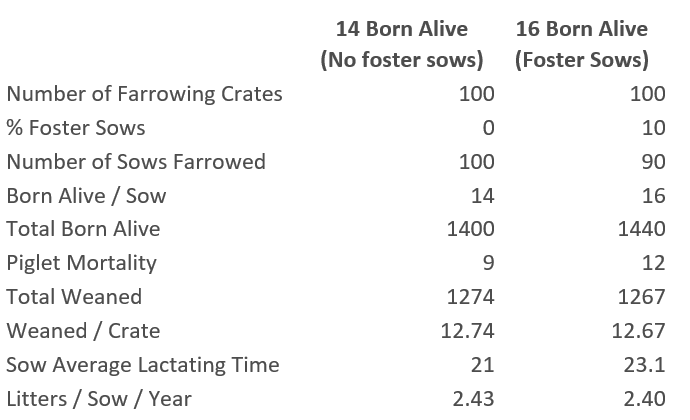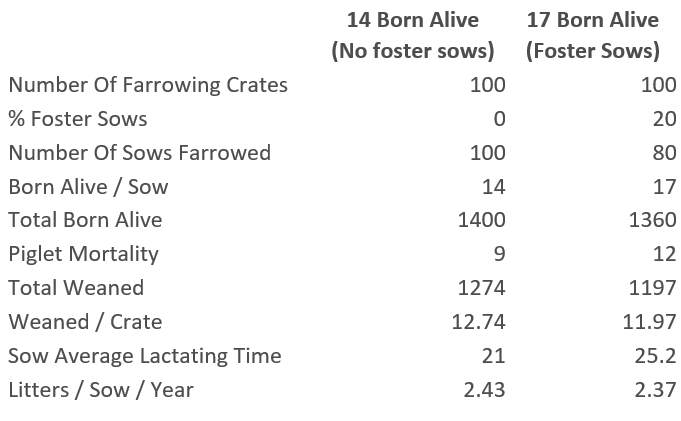



Genesus Global Technical Report: foster sows – economic or not?
For many, leaving 10 percent to 20 percent farrowing crates empty because of big litters has become the norm, with many advisors and farm designers advocating the practice. Is it however economic? When you look at the numbers and consider the extra work, the math says definitely not!On the vast majority of sow farms, it is the number of farrowing crates that is the limiting factor. In all businesses, we are always trying to improve efficiency and produce more and at lower cost. Therefore, pigs weaned per farrowing crate per year and cost of weaned piglet are the two most important factors when looking at the performance of a sow farm. In terms of cost, sow food per weaned pig and facility cost are two of the big ones. The target is 36 kg. (79.36 lbs.) to 38 kg. (83.77 lbs.) sow feed per weaned piglet.
In our modern world of worrying about carbon footprints, maximizing output from a facility (pigs weaned per crate) is the best way to minimize carbon footprint.
If I take a farm with 14 born alive and no foster sows vs. a farm with 16 born alive (2 higher) and 10 percent foster sows, then when looking at pigs weaned per crate the 14 born alive comes out just ahead.

Two extra pigs born alive is a lot but is canceled out by just 10 percent foster sows!
If we look at 3 extra born alive and 20 percent foster sows then the 14 born alive once again comes out on top, by some distance. I am now seeing farms with very high born alive using 20 percent foster sows!

Pigs weaned / crate / year
On Metafarms benchmarking system in the USA, top 10 percent of farms are weaning 189 piglets per farrowing crate per year. This is achieved without born alive of 16 and 17 piglets and is considerably higher than most sow farms in the world.
It is important to understand that on a pig farm we are managing space and time, much more than the pigs on the farm. Space is fixed, the pigs pass through the farm.
It is also important to understand real economic effects on farms. Traditional measures like born alive tell us nothing about farm economics.
For high pigs / crate sows need to rear their own piglets
Genesus’ research from several years ago has shown that sows can rear more piglets than the number of teats they have. Milk production is a far more important genetic trait than teat number. Selecting for lactation feed intake and therefore milk production is an important genetic trait. We expect sows to have an average feed intake of 7.5 kg. (16.53lbs.) per day. On a 21 day lactation period the total intake averages at 157.5 kg. (347.22 lbs.)
Research done in Denmark and published last month supports Genesus research. The Danish trial took sows with 14 teats and gave them 14 or 15 piglets to rear. Mortality and weaning weights were the same for both test groups, showing also that sows can rear more piglets then they have teats for.
Fewer people to care for sows
In the world today, it is getting more difficult to find the skilled staff to care for pigs. Sows that are easy to manage, that can be fed ad-libitum in lactation and that can rear their own piglets will become more and more important.
Feeding piglets and fostering are very skilled tasks and very time-consuming.
Time is money, another reason for choosing sows that can rear their own piglets, and with the high lactation feed intakes required to do so!









